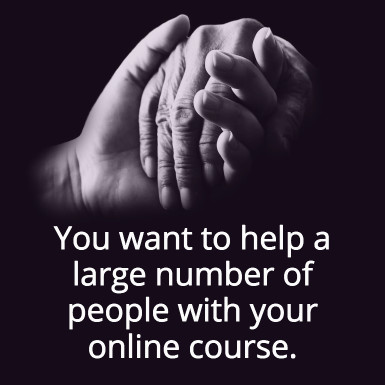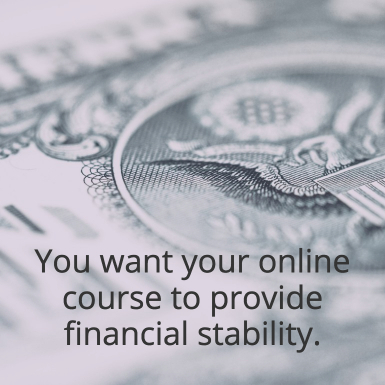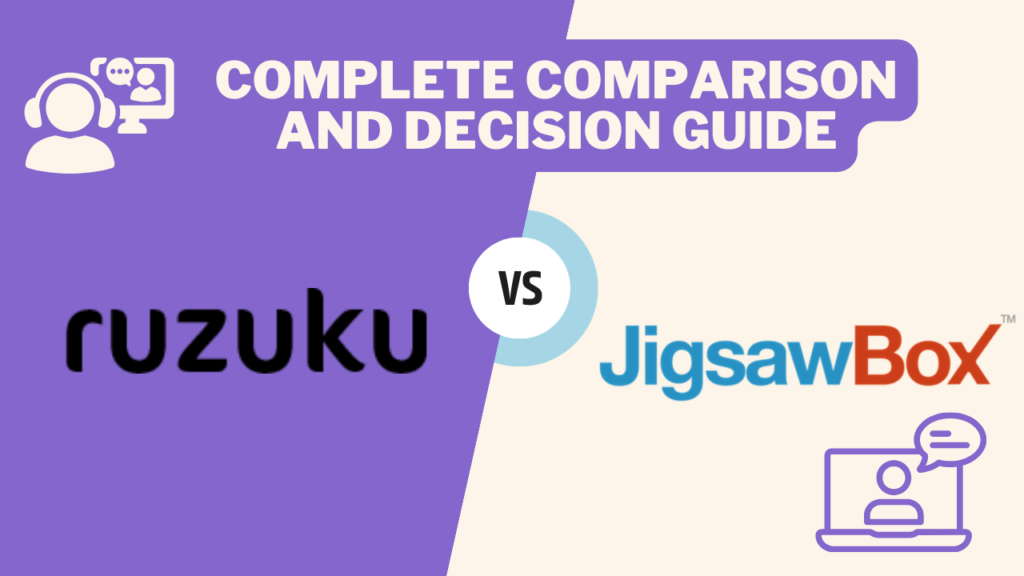Every day it seems like another rising star takes the online stage, effortlessly launching their first online course to rave reviews.
But then you look around you… and see a community of course creators who are struggling to get off the ground.
Maybe they’re stuck just trying to get their first course created.
Or they got the course created and then launched — to nothing but crickets, or just a handful of sales.
You know that success is possible, but you don’t know what separates the success stories from the ones who never make it.
To help you figure out what it takes to be a successful online course creator, I sat down with Ruzuku’s co-founder Abe and customer success wizard Felicity to take a look at some of the biggest patterns we’ve seen through the years.
What we discovered will help you join the ranks of those successful course creators.
Before we get started, here’s a question.
What does success mean to you?
Let’s look at how you define success. Three big possibilities emerged during our discussion:
- You want to have a big impact and help a lot of people,
- You want your courses to bring you financial stability, and/or
- You want flexibility and the ability to leverage your time.
Your definitions of success may fall under these three categories. Or you may have another idea of what success means to you.
Whatever your definition, let’s look at the patterns we see based on each type of desired success.
If you want to make an impact
If success means helping a large number of people reach their goals or solve a painful problem, ask yourself the following questions:
1. Is your story compelling?
You have to tell a good story about your online course and what it can do for your audience.
 We see successful course creators who aren’t really teaching anything new or groundbreaking.
We see successful course creators who aren’t really teaching anything new or groundbreaking.
But they do such a good job of communicating what they’re doing that it almost doesn’t matter.
You have to communicate the expertise you have, and show how that experience makes a difference for your students and clients.
And speaking of expertise…
2. Have you put in the time?
Sometimes it just takes time and effort to reach a place where you start to see more success than failure.
The internet marketing era may have sparked the idea of “make money online fast and with no effort”— but by now we all know it takes hard work to be successful.
There’s an unfortunate trend of people who want to teach things, but don’t have the sweat equity to back it up. ~ Abe
Behind every story of “overnight success” is the long hours, the failures, and the effort that led to success.
When you’ve put in the time, you’ll start to understand your subject in depth. Then you can begin to see the patterns behind what’s really going on in your industry and with your students.
Included in the patterns you should be looking for is how focused you are.
3. Are you focused on the right things?
Beginners often have trouble focusing and want – or feel they have to – do all the things.
Successful course creators know what path they’re on. They aim at a goal and limit their distractions. And they know when to ask for help, and aren’t afraid to reach out when they’re stuck.
Knowing when to ask for help comes along with having confidence in yourself and your course idea.
4. Do you have confidence?
Successful instructors have confidence — both that they can be successful and that they know how to teach their course material. Abe calls this a sense of capability.
They also know that what they’re offering is of value to their audience. They don’t second-guess their abilities or ask “why would anyone pay attention to me?”
But maybe impact isn’t what defines success for you. We all have bills to pay, after all.
If you want to make the big bucks
If success mainly means financial stability, ask yourself the following questions:
1. Do you have an angle into your market?
Every single successful course on the Ruzuku platform has a specific angle — you won’t find any generic course titles or topics among them.
 This means understanding your customer on a deep level, and being tightly focused on them in your course offerings and your marketing.
This means understanding your customer on a deep level, and being tightly focused on them in your course offerings and your marketing.
For example:
Padraig O’Morain is a Ruzuku instructor who does this incredibly well. He teaches an approach to mindfulness that doesn’t involve traditional meditation.
His courses aren’t “just another meditation course” and they’re successful because of his fresh interpretation. He understood what was missing in his market, as well the objections to the current approach and offerings.
As well as understanding how to stand out from the crowd, you have to read your customer’s mind.
2. Can you meet your customer where they are?
You have to understand your customers from both a teaching perspective and a marketing perspective.
Really successful instructors need to balance both, or know when they need to ask for help. Trying to market from a teacher’s perspective often falls flat (and vice versa).
To further complicate this issue, our educational system is stuck in an outdated paradigm of learning — Instructionism, or the “Sage on the Stage.” This model perpetuates the idea that the teacher is an expert who just delivers content.
Instead, successful instructors know that engagement is key to students sticking with their online courses. Questions and interaction will show you where your students don’t understand a concept. And the best instructors understand that students won’t understand the subject matter the same way an expert does.
One of the ways to meet your customer where they are is to weave a story into your marketing.
3. Do you know how to create a demand narrative?
Launching a course isn’t just creating something and being like, “Here, buy this!”
Most of your audience members have taken a course or tried to solve their problem in the past, and failed. You have to explain why your course will help them where others haven’t.
Successful instructors have figured this out and their marketing always shows proof that their course will work.
This can also mean building up your experience in a different context and applying it to a new field.
For example:
Jeanine Blackwell gained her experience working for big companies. She then applied what she knew to entrepreneurs. Everything she teaches is grounded in a background in learning experience design.
The next pattern is a willingness to take things one step at a time.
4. Are you trying to fly before you can walk?
The instructors who see big improvements in their courses are committed to systematic and incremental improvement. It’s not usually one giant, sudden transformation that rockets them to success. Rather, they try new things and get better with each attempt.
For example:
Abe tells us if you launch your course four times a year and see a 2% improvement with each launch, you’ll move ahead dramatically more than you might think. Two percent doesn’t seem like that much on its own, but the impact compounds with each new launch.
The most successful courses on the Ruzuku platform are scheduled courses that run several times a year, as opposed to always-open (evergreen) courses.
Successful instructors run multiple cohorts of a single course throughout the year, and learn a lot along the way. After they have offered several runs of the same course, then they look at how they can scale up that course to an evergreen offering.
That’s not to say that evergreen courses don’t work, but they tend to be more successful in the long-term. And as we’ve seen over and over, “passive income” is myth. It takes a lot of hard work and marketing to create a steady stream of income from evergreen courses.
But maybe it’s not all about the cash — perhaps you’d rather not trade time for money.
If you want freedom and flexibility
Moving away from trading time for money is probably the most challenging goal to achieve. But we know that’s why a lot of people want to create online courses.
If success means having the flexibility to work when and where you want, ask yourself the following questions:
1. Do you focus on planning?
Successful instructors work incredibly hard and put a lot of time into their courses.
 For those who are able to move away from trading time for money, it’s usually because they are methodical in the way they plan things out.
For those who are able to move away from trading time for money, it’s usually because they are methodical in the way they plan things out.
They create boundaries so they’re not tied up in their courses all the time.
They usually have a course calendar for all their scheduled course offerings. They understand when and how they need to market for each, and they stick to their intended course dates.
The most successful instructors have the confidence that they can fill their course sessions from their current audience.
Freedom of time means having systematic marketing set up that fills your courses each time you offer them. ~ Abe
There’s also another possibility for moving away from the money-for-time trade.
2. Do you have pricing power?
Flexibility can also come from having control over the prices that you charge.
Successful instructors work at increasing both their actual and perceived value over time. Because of this, they can then charge more for their courses and their services.
The reality is that there’s no other way out of the hours-for-dollars trap than to increase the number of dollars you’re getting for your time.
It’s a combination of two things:
- Helping more people through your courses, and
- Working to improve your pricing and include more high value course offerings.
It’s also helpful to be methodical about the way you approach your pricing. Set a specific goal and measure your progress toward it.
Knowing your “effective hourly rate” will help you know whether you’re making progress toward your goal. To calculate the rate, take your net business income and divide it by the number of hours you worked in a month.
Having multiple course offerings will also help you keep your current customers interested.
3. Do you know how to move people through your funnel?
Getting people to buy the first course is the hardest hurdle to overcome.
If you can nurture your relationship with your students toward the end of whatever course they’re taking, you can more easily move them into whatever comes next.
Successful instructors have a sales funnel that easily moves students from the first course into the second (and the third). Having a sales funnel reduces the effort of selling with each additional course and helps them take back some of their time.
Now that you know the patterns, what’s your next step?
Become the next big success story
No matter what success means to you, you now know some of the top reasons that online course creators see big success.
It’s not about luck or being in the right place at the right time — at least not usually.
It’s about hard work, putting in the time, and being willing to work with your audience to create a course that they can’t resist.
There’s nothing that today’s successful instructors are doing that you can’t do.
Now it’s up to you.
Which of the habits and behaviors in today’s post can you implement into your course creation? And what’s your definition of course creation success? Let us know in the comments!





4 Responses
Thanks for the mention! Timing is also worth considering. For me (based in Ireland) The end of January/early February and also September are good times to start courses. November – as I’m finding out right now! – is a terrible time for my online courses though it’s a great time for courses in venues.
More than happy to include your great example, Padraig! And thanks for the additional wisdom – timing is such an important consideration. Very interesting to see the difference between online and in person!
When I asked a classmate of mine why he would be changing his career option from psychology to psychiatry, his answer was “to make more money.” Let me ask you: how successful would he be really in treating his patients with that type of attitude? Would he even care?
I believe that all potential course creators would gain from choosing your first option of success to start with—“have a big impact & help lots of people.” By the way, what you say or think shapes your behaviour—I learned that recently.
A course creator’s primary focus—and hopefully their desire—should be to help people. Anyone with that attitude will take the time to know their subject in depth, to know their industry and their prospect.
That type of mindset will, in turn, motivate them to produce an excellent marketing story about their course, one that will show convincingly to their audience what it can do for them. It will establish them as experts in their field; and lastly, they will then be confident in their success and in their ability to teach their courses.
It is during the marketing phase, that changing your focus to “achieving financial stability” (option 2) would be appropriate; and, with time, choosing Option 3—“having the flexibility and the ability to leverage your time”—could be the next step.
Anyone reading this could argue: “of course, my intention is to have a big impact and help a lot of people.” But, what is their primary motivation—money or helping others? The mind is tricky. Focusing on money first may not result in a successful course
Thanks for the really well-thought-out comment, Catherine. We definitely see a higher level of success from those who want to help people as their primary motivation! (Thought the world is still full of folks who want to make money or have flexibility as their primary motivators…)